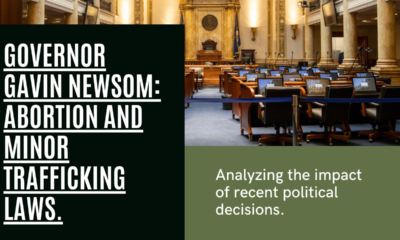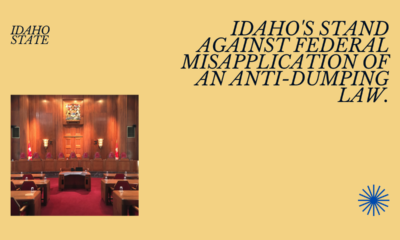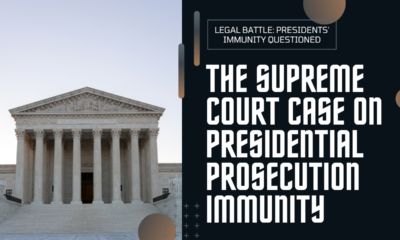Editorial
Rome v. America: when nations die

It is said that those who don’t learn from history are doomed to repeat it. While listening to the details about Congress’ latest financial deal, along with all the hype regarding the Newtown tragedies, several similarities between ancient Rome and these United States came to mind. I then decided to do a little research into the reasons Rome fell – thinking that the similarities between the gladiator games and our violent entertainment, along with our out-of-touch bureaucrats and Rome’s notoriously out-of-touch Senate would take center stage. I was not prepared for what I found. The list of similarities nearly knocked me off of my chair.

St. Peter’s Square, Vatican City. Wide-angle view. Photo: Francois Milan. CC BY-SA 3.0 Unported License
The debate about all the issues that lead to the collapse of Rome is still going on and probably will be for some time. The truth is that there were many issues that contributed to the fall of Rome. The ones listed below are the ones that most historians agree with and the ones that bear disturbing similarities to conditions in America today. Read them and weep – or get mad and do something to change the road we’re on. Everett Hale once said: “I am only one, but I am one. I cannot do everything, but I can do something. What I can do, I should do and, with the help of God, I will do!”
Table: Parallels between ancient Rome and modern America
|
Factors that contributed to the fall of Rome |
Similar factors that exist in America today |
| Antagonism between the Senate and the Emperor | Antagonism between the President and Congress, as well as between our two major Parties |
Economic factors included:
|
Economic factors include:
|
| Decline in morals – especially in the rich upper class. | Decline in morals – especially within the entertainment and sports industries. |
| Political corruption was rampant | Political corruption is rampant |
| Constant Wars | Constant Wars |
| High unemployment within the working class, resulting in increasing dependency on government | Rising unemployment within the working class, resulting in increasing dependency on government programs. |
| High cost of the “Dole” which was government supplied bread and entertainment for the non-working poor. | High cost of government dole, including food stamps, Medicaid, extended unemployment insurance and other government entitlement programs. |
| Unrestricted trade agreements with foreign nations, resulting in Roman citizens not being able to compete with foreign trade. | Free trade agreements that have resulted in loss of American jobs, since Americans cannot compete with foreign low wages. |
| Class warfare between the rich and the poor. | Government inspired class warfare between the rich and the poor. |
| Increased government subsidies enabled citizens to live comfortably without working. | Increased government entitlements allow citizens to live comfortably without working. |
| The mob and the cost of games – the roman government provided circuses for the unemployed. | Government now supplies cell phones and many perks for those living below the poverty line. |
| Decline in ethics and values – the decline in Roman ethics and values is well-known and needs no further explanation | America has experienced a decline in ethics and values that cannot be argued and needs no further explanation. |
| Decline in morals led to the destruction of families. It was not common to have two parent households. | Decline in morals is leading to the destruction of families. It is now common to have single parent households. |
| Barbarian Invasion | For America, this can be considered to be Islamic terrorists. |
| Expansion of government – Ralph Martin Novak, author of “Christianity and the Roman Empire,” stated:“…whereas at the start of the third century A.D. the Roman emperors employed only about 300 to 350 full-time individuals in administering the Empire, by 300 A.D. this number had grown to some 30,000 or 35,000 people.” | Expansion of government. It has been said that today you will work for the government one way or another. |
| High taxes were instituted to fund growing government and its programs. | High taxes are being instituted to fund growing government and its programs. |
| Government ceased being the servant of the people and became its nanny. | The Nanny State is increasing exponentially. |
| Practices of infanticide were justified and legal. | Abortion is justified and legal. |
| Gladiator games, chariot races, and forms of violence were considered entertaining. | Violent games of all kinds are considered entertaining. |
| Paganism and religious tolerance ruled – except for Christianity. | Religious tolerance rules – except for Christianity. |
| Decline of the military and reduced incentives to join, including lack of respectable leadership. | Attempts to disrespect and underfund the military have thankfully been unsuccessful. |
| Citizenship granted to foreigners | Amnesty and disregard for immigration laws. |
| Romans became globalists instead of nationalists. | Americans are encouraged to become globalists, abandoning patriotism. |
| Decline in education, which had previously been conducted privately within homes. Prosperous Roman families began to hire Greeks to teach their children. The Greeks taught humanistic and godless philosophies. | Decline in education by government-run schools. Our government-run schools teach secular humanism and evolution, which portends that supernatural creation did not occur. |
Resources:
[ezadsense midpost]
http://ancienthistory.about.com/cs/romefallarticles/a/fallofrome_3.htm
http://www.roman-colosseum.info/roman-empire/reason-why-the-roman-empire-fell.htm
http://www.catholicnewsagency.com/column.php?n=1907
[ezadsense leadout]
-

 Education2 days ago
Education2 days ago‘Grading for Equity’: Promoting Students by Banning Grades of Zero and Leaving No Class Cut-Ups Behind
-

 Civilization4 days ago
Civilization4 days agoEarth Day Should Celebrate U.S. Progress & Innovation
-

 Civilization3 days ago
Civilization3 days agoNewsom plays silly abortion politics
-

 Family2 days ago
Family2 days agoIdaho defends against abortion mandate
-

 Education4 days ago
Education4 days agoThe Intifada Comes to America. Now What?
-

 Constitution1 day ago
Constitution1 day agoPresidential immunity question goes to SCOTUS
-

 Civilization4 days ago
Civilization4 days agoEarth Day – part of cultural Marxism
-

 Civilization3 days ago
Civilization3 days agoWaste of the Day: China Still Owes Over $1 Trillion to American Bondholders














Michael Alan Kline Sr liked this on Facebook.
“Prosperous Roman families began to hire Greeks to teach their children.”
Yes. In about 400BC.
Ignoring the basic error that Rome was an EMPIRE not a Nation:
“Another theory that has been propagated about the “Fall of the Roman Empire” is that the Empire never actually fell in some dramatic course of events, and instead slowly transformed itself into a rudimentary form of what we would call “Medieval Europe”. Indeed the actual toppling of the Western Empire as a political structure was simply the last step in a long period of social change. The Empire had become less and less “Romanized” as time passed, and the Germanic peoples that had been the Empire’s neighbors slowly assimilated themselves. Scholars point to the continuation of Christianity, Roman Law, and the sustainment of the Eastern Roman Empire in the form of Byzantium, as well as other examples.
Since the time of the Emperor Constantine, Christianity had been the official religion of the Roman Empire. The church, with imperial support, began to establish its own structure and hierarchy. The church added a new dimension to Roman society, in which spiritual matters began to take precedence over their political counterparts. Indeed, “the theologians preached doctrines that minimized the importance of serving the state” (Grant).
Henri Pirenne has argued that the “Roman empire, in the economic, political, and cultural senses, survived and even prospered throughout the period of the barbarian invasions.” He claims it was the rise of the Islamic faith in the east which culturally divided the empire and led to its eventual breakup. He claims that the empire ended sometime during the seventh or eighth century when Islam “destroyed the unity of the Mediterranean and turned it into a Moslem lake.” During this time, the disunity of the Roman empire rendered it powerless against this movement.
In summary, scholars have argued that the Roman Empire did not end abruptly for a specific reason, but rather underwent a gradual transformation. These scholars see change as inevitable and look at “The Fall of Rome” as simply “time running its course.”
The above is taken from the first link quoted in the original post.
link to ancienthistory.about.com
The sort of simplistic notions of the “Fall of the Roman Empire” expounded by Ms.Salanitri have long been discarded by serious scholars. May I suggest reading ‘The Fall of the Roman Empire’ by Peter Heather for a take on the ‘gradualist’ school of thought and ‘The Fall of Rome’ by Bryan Ward-Perkins, a proponent of the ‘catastrophic’ school of thought? Both should be available in the USA and will quickly disabuse the reader of the idea that the ‘Fall’, if it can be even called such, can be considered such black and white terms as displayed in this article.
As to comparing Rome to today’s America… it’s a complete nonsense. The differences in technologies and information available to both the governors and the governed, just for starters, make any such comparison a totally pointless exercise.
Just one thing for now, about your last paragraph: the technological advances are far less momentous than you make them out to be. I put it to you that, were America to fall, a modern-dress feudalism would temporarily take its place. The old lords (“law-wards”), dukes (“leaders”), and earls (literally, warriors) would have their modern counterparts. Any person who, with sufficient foresight, gathered to himself the resources, and the followers, to set up a stronghold, would be as powerful as any feudal baron, count/earl, or duke. And such strongholds would be the only nuclei of law or order against the marauding bands of scavengers into which the larger society would dissolve.
You forgot to compare the cumulative lead poisoning from their plumbing, to the fluoridation of today’s water.
It’s about as relevant as the rest of your points.
Of course, after the fall of Rome, came the Dark Ages, where the Church suppressed science and the spread of knowledge – kinda like the religious right want to do in the US right now. So there’s another example for you.
This might surprise you: I, for one, would accept your parallel of the lead poisoning from the lead water pipes to the practice of adding hydroflouric acid to municipal water supplies. We don’t have an alternative-medical category here on CNAV. If we had, we’d condemn the fluoride programs just as much as you seem to do above.
But: the real reason the Dark Ages were so dark, was the lack of law and order, and the near-confinement of said law and order to a handful of feudal strongholds and whatever territory that ducal or baronial forces, or county shire-reeves, could guard. And instead of the Established Church you so fear, we’d get an Established Anti-church. A society that would stamp you like a heifer before it would permit you to transact any business in it. Revelation 13:16-18. Look it up.
The whole point about the “Fall of the Roman Empire” is that modern scholarship now generally accepts that it wasn’t “marauding bands of scavengers” that took over in one catastrophic event, as Ms Salanitri implies, but rather a gradual evolution as one system of governance was replaced by an alternative one. The new model was no longer based on a strong empire-wide civil and military authority but rather on a series of strong regional civil and military authorities. Certainly there was disorder as the transformation occurred but there is serious scholarly debate as to the extent of this disorder; for most people it was probably ‘business as usual’. Given Ms Salaitri’s previous writings and her penchant for decrying the centralised US government, I would have thought she would have welcomed such a process.
Sadly, the witnesses from that lawless period are no longer alive, nor does anyone bother to read any of the literature of the period. If either of those conditions obtained today, modern scholars would not be so quick to dismiss as mere hiccups the disorders that occurred.
Did your modern scholarly sources describe, for example, the technology that Roman society commanded shortly before the Fall? Running water. Hot water. Furnaces. Metalled roads. Western Europe forgot all that valuable technology. It’s rather difficult to equip a stronghold with a thing that requires a vast network to deliver! That is why the ancient aqueducts are mere curiosities today. Once they were the water mains of Rome and several of Rome’s largest satellite cities.
No person who has not suffered the loss of the network infrastructure of civilization can possibly imagine just how “disorderly” that state of affairs can be. Two words should suffice: Hurricane Sandy.
That d____d great storm knocked me off-line for five straight days. And we are still talking about whether and how to restore entire communities that lost not only infrastructure but superstructure as well. And I’ll let you in on a little secret: in Jersey City, New Jersey, gun battles broke out over scares supplies of motor fuel.
If a storm having a regional effect can do all that, imagine the sort of chaos that would attend the fall of the centralized authority that the United States government has now become. Imagine, if you will, your local county exec calling himself a “count” in the feudal sense. Or your mayor calling himself a baron, or your governor calling himself a duke.
We at CNAV will not deny that some persons, with whom either or both of us correspond (or used to correspond), have expressed a sentiment, halfway between fear and eagerness, that a total, general default and collapse of the United States is inevitable, no matter how many people of good will could possibly displace all the people of bad will now in charge, and even if they “knew what to do.” They state that more than a century of fractional reserve banking, coupled with the (by definition) highly leveraged market in “derivatives,” means that the same credit unit, however named (dollar, euro, Swiss franc, yen, sterling, or what have you), is already mortgaged a hundred times over. Thus, no power on earth could ever repay all of the debts of record, if a few key debtors went into default. That might have been one of the nightmare scenarios that Bush the Younger gave out in that secret meeting, to persuade people to accept the first Trouble Asset Rescue Plan (TARP). The Depression of 1929 will look like a picnic in comparison to this.
That’s the case they make. And so far, it’s holding up.
I mentioned “halfway between fear and eagerness.” The fear is that the Obama administration, and the Internal Security Force he is building (and ordering billions of rounds of ammunition to supply), will march into every State capital and city hall and take them over. They will offer order in the face of the chaos that will supervene. Gun battles for gasoline? Coming to your neighborhood. It won’t be in any theater, for lots of reasons, not least of which that the theater will be closed for lack of electric power. Grocery stores: closed. Stripped bare. Your water faucet? Dry. In the face of that, people will cry out for law and order. And DHS are getting ready for that.
Or so they think. Now they’re plenty worried about those who are “preparing” for the disaster to come. They are stocking up on foodstuffs, water, guns, and ammunition. They are preparing “bug-out holes.” Hence the gun-control measures you now hear of.
If I were you I would convert every bit of cash I had on hand, except enough to keep up a minimum cash flow, into gold and silver coin. The Nice Government Men have somehow driven the price to an absurd low. Too many regular investors simply don’t understand the situation. Once they realize it, it will be Katie Bar the Door. And those coins will be your only way to acquire any goods in trade.
Let me remind you of one thing more: the German equivalent of “Internal Security Force” was once spelled “Schutzstaffel.”
“Sadly, the witnesses from that lawless period are no longer alive, nor does anyone bother to read any of the literature of the period. If either of those conditions obtained today, modern scholars would not be so quick to dismiss as mere hiccups the disorders that occurred.”
Considering Ms Salaitri’s article was about events that took place 1500+ years ago it’s not surprising the witnesses are not alive. However, to suggest that no one bothers to read the literature of the time and if they did their views would be different is absolute nonsense. I mentioned two books previously: Heather and Ward Perkins. A brief look at their bibliographies shows that Heather (Professor of Medieval History at King’s College, London) refers to 42 different primary sources and Ward-Perkins ( Lecturer in History, Oxford University ), in a much shorter book, some 25 different primary sources; hardly a case of not bothering to read any of the literature of the period. One wonders how many primary sources Ms Salaitri consulted in producing her article.
The resources of the Roman Empire and the technologies you describe, running water, aqueducts etc. did of course exist. But, and it’s a very big but, they were concentrated in the larger towns and cities and on the estates of the landed elites. The majority of the population of the Empire in the west at the time of its dissolution, lived, as the majority population of the empire had always done, in the countryside and access to the technologies you describe was for them, limited in the extreme, if it existed at all. That such technologies disappeared when the empire was dissolved is not in dispute but bear in mind the Roman City as a an economic and political entity had been in decline, particularly in the west, for several hundred years prior to 476. (See: Integrating Late Roman Cities, Countryside and Trade. Harmut G.Ziche at: link to academia.edu )
I’ve got no particular comment to make on your statements about the modern American situation; I don’t know enough about it. I do, however, know enough about Late Antiquity and the period of the transformation of the Roman Empire to realise that Ms Salaitri’s article is historically incorrect, as I have tried to demonstrate.
Then consider this: today, even the rural folk still have access to network-infrastructure technologies. Consider how they would react if those got shut off.
But at that, they would be in better shape than would be those who live in the cities. Those cities would go up in smoke and flame and tear gas. (And maybe the forces of a certain prophesied world dictator would parachute into those cities “to restore order.”)
Vwery well thought out article. Thanks
Better thought out than my previous spelling!!
[…] Rome v. America: when nations die (cnav.news) […]
[…] Rome v. America: when nations die from Conservative News and Views […]
Not much difference at all between our nation and an empire:
“The term empire derives from the Latin imperium (power, authority). Politically, an empire is a geographically extensive group of states and peoples”
If you mean to say the United States should go back to being the looser federation that existed before the War Between the States (after which we started saying “The United States is“, not “The United States are“), I might be inclined to agree.
No offense Terry, you freaked out way too much about hurricane sandy….Basically you lost power (and thus some phone and water access) for a bit, something anyone from the north has come to accept as a way of life during the winter. Want a good example of a natural disaster that cut people off from the large networks of society?
Try Hurricane Katrina. Which did a whole heck of a lot more than inconvenience people. Those were people thrust into a world of butchered law and order because of a fallen government (essentially)
That happened for two reasons. First, the people expected government to wave its magic wand and either keep the hurricane away or somehow make things work as usual in spite of it. Second, Mayor Ray Nagin fiddled while his city, and a thousand school buses, drowned.
[…] government is that we are both a republic but Rome was a mix of Democracy and republic. Rome and the United States’ have poor management and leadership in and by their […]
[…] Rome v. America: when nations die | Conservative News and Views. […]
[…] To read this article in its entirety use the following link: link to cnav.news […]
[…] is becoming the modern day late Roman Republic/Empire: Rome v. America: when nations die | Conservative News and Views I can not abide useless people. The only way Obama can become a bigger idiot is by […]
[…] specific comparanda and an insight that can be drawn from your overall study. For example, a very common topic in the media (and, apparently, American classrooms) is the comparative politics and history […]